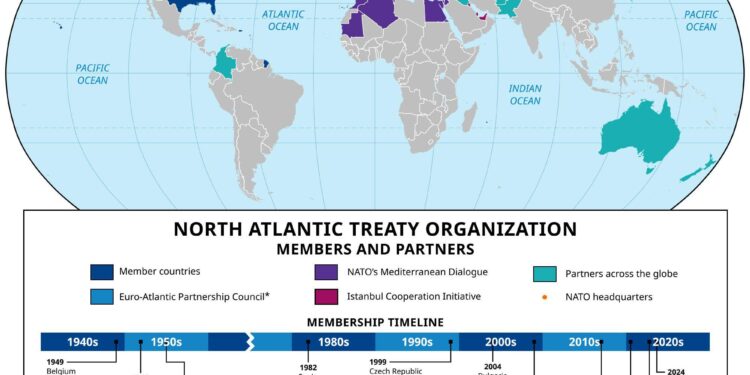The prospect of NATO membership has sparked renewed debate over the status of the Ă…land Islands, an autonomous Finnish archipelago in the Baltic Sea. As Finland moves closer to joining the military alliance, questions arise about how the traditionally demilitarized and neutral Ă…land Islands might be affected. Euractiv examines the potential geopolitical and legal implications for the islands’ unique position amid shifting security dynamics in Northern Europe.
NATO Membership Raises Strategic Questions for Aland Islands’ Neutrality
The prospect of Finland and Sweden joining NATO has cast a spotlight on the long-standing neutrality of the Ă…land Islands, a demilitarized archipelago with a unique autonomous status under Finnish sovereignty. Analysts warn that this shift could challenge the islands’ current defense arrangements and raise legal complexities tied to existing treaties guaranteeing their non-militarized status. As NATO membership entails collective defense obligations, questions emerge about how to reconcile alliance commitments with Ă…land’s special international standing.
Key strategic considerations include:
- Maintaining Ă…land’s demilitarized status within a collective defense framework.
- Ensuring that NATO’s presence does not infringe upon the islands’ autonomy and local governance.
- Balancing Finland’s security interests with international diplomatic sensitivities in the Baltic region.
| Aspect | Current Status | Potential NATO Impact |
|---|---|---|
| Military Presence | Prohibited | Possible re-evaluation |
| Autonomy | High | Preserved with safeguards |
| International Treaties | Binding | Require review |
Experts Warn of Potential Security and Political Implications in the Baltic Region
Security analysts caution that the Aland Islands, an autonomous and demilitarized region under Finnish sovereignty, could experience shifts in their status amid Finland’s NATO accession. The strategic location of the islands in the Baltic Sea makes them a focal point for potential geopolitical tensions between NATO members and Russia. Experts underline that the integration of Finland into the alliance may challenge the existing security arrangements that have long maintained the archipelago’s neutrality, raising concerns over increased military presence and surveillance activities in the vicinity.
Beyond military considerations, political ramifications are also a cause for concern among regional observers. Key points highlighted include:
- Diplomatic Strain: Possible diplomatic friction between Nordic countries and Russia, impacting broader Baltic stability.
- Local Autonomy: Risks to the unique self-governance model of the Aland Islands, which may come under pressure as alliance commitments deepen.
- Economic Effects: Potential disruptions to shipping routes and local trade due to escalated tensions or military exercises.
The complexity of maintaining the balance between national security and regional autonomy remains a delicate challenge as the Baltic region navigates these evolving dynamics.
| Factor | Potential Impact |
|---|---|
| Demilitarization | Risk of being compromised, altering the current neutral status. |
| Diplomatic Relations | Increased tension between NATO and Russia in Baltic Sea. |
| Local Governance | Possible pressure on autonomy and legislative independence. |
Calls for Updated Legal Frameworks to Safeguard Aland Islands’ Autonomy Amid NATO Integration
The potential integration of the Aland Islands into NATO’s strategic framework has ignited a wave of concern among local lawmakers and international legal experts. The current legal instruments governing Aland’s autonomy, established under the 1921 Aland Convention, may not sufficiently address the complexities introduced by NATO membership. Experts emphasize the need for updated treaties or amendments to existing agreements to ensure the Islands’ special status is preserved without compromising their neutral stance.
Key areas identified for urgent review include:
- Security obligations: Clarifying the defense commitments and the extent to which NATO involvement may affect Aland’s neutrality.
- Governance autonomy: Reinforcing legislative powers and local decision-making in the face of supranational military cooperation.
- International oversight: Establishing mechanisms to monitor compliance and prevent unintended shifts in sovereignty.
| Aspect | Current Status | Proposed Updates |
|---|---|---|
| Neutrality | Guaranteed under 1921 convention | Need for NATO-specific clauses |
| Military Presence | Prohibited on islands | Clarified rules on allied forces |
| Local Legislation | Full autonomy | Safeguards against external intervention |
In Retrospect
As discussions surrounding NATO membership continue to unfold, the status of the Ă…land Islands remains a critical point of consideration. With their unique demilitarized and autonomous status under international treaties, any shift in Finland’s security alignment could prompt complex diplomatic and legal challenges for the region. Stakeholders across the Baltic Sea are closely monitoring how these developments may reshape the islands’ future, underscoring the broader implications of evolving security dynamics in Northern Europe. Euractiv will continue to track the story as it develops.
















